Strategy July 24, 2015
College Entrepreneurs Make Success Last
Starting in college, many apparel go-getters turned their entrepreneurial itch into thriving industry companies.
Starting in college, many apparel go-getters turned their entrepreneurial itch into thriving industry companies.
A senior at the University of Florida looking to make a quick (and legal) buck, Mitch Weintraub started a T-shirt business with his friend – and Alternative Apparel (asi/34850) founder – Greg Alterman in the ’90s. Drawing from an intimate knowledge of their target audience, the men designed “really cool T-shirts that were really funny,” centered on the social side of higher education: drinking, partying and Gator pride, Weintraub says. One of the most popular shirts bore the slogan, “Life is full of difficult decisions,” printed over a slew of beer brands. “We were probably breaking so many licensing laws, it was ridiculous,” Weintraub recalls with a laugh.
Hefting bags packed with 100 T-shirts each, Weintraub and Alterman regularly trolled the dormitories to hawk their wares. The competitive pair would meet up in the stairwell after finishing each floor to tally earnings and see who had sold the most shirts. That is, if they hadn’t detoured into a fellow student’s dorm room to dodge a nosy RA or roving campus police officer. “We were getting kicked out of dorms on a regular basis. It was probably one of the most fun times of my life,” says Weintraub, who would go on to found the distributorship Pinnacle Promotions (asi/295986) with his brother David.
The experience was about more than just making money and having fun, though. The two dorm-to-dorm salesmen were learning valuable business lessons – everything from branding and sales to vendor relations and budgeting – in a low-stakes environment that allowed room for missteps, miscalculation and even failure. In fact, a surprising number of today’s successful industry entrepreneurs got their starts while still in school.
Chalk it up, in part, to the confidence and resilience of youth. “When you’re younger, your appetite for risk is a lot bigger,” says Danny Rosin, co-president of distributorship Brand Fuel (asi/145025). Few undergraduates have mortgages or families to consider before jumping into an uncertain business venture. Now that he has two daughters and 25 employees counting on him, Rosin says he’s more careful before making big decisions. “I’m the devil’s advocate a lot more now,” he adds.
As a freshman at the University of North Carolina at Chapel Hill 20-odd years ago, Rosin was ready to go all in. “I was willing to plunk down $500 on an idea that I hoped would win for a chance to bring back $1,100 after a hard day’s work,” he said. “I think I learned the $500 lessons early and avoided some of the more expensive $5,000 lessons I might be learning today.”
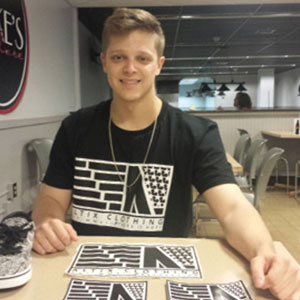
A senior at Albright College, Kevin Ostromecki is growing his custom shoe and screen-printed apparel line, Altix Clothing.
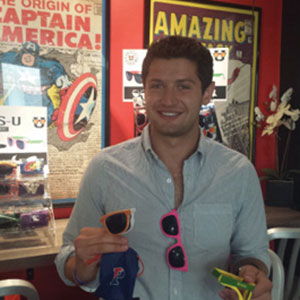
Daniel Fine, founder of sunglass company Glass-U (asi/57361), started his business while earning his bachelor’s from the Wharton School of the University of Pennsylvania.
His $500 idea at the time was to cash in on an intercollegiate rivalry by creating an anti-Duke T-shirt to sell during sporting events. Rosin recalls being turned down by several screen printers unwilling to break licensing or trademark laws, before eventually being pointed to a shop owned by a “warmed-over flower child” who agreed to print the design. The printer asked Rosin to meet him behind the post office with $500 cash in hand. “He took the money and drove off in a beat-up old pickup truck with ‘Kiss my art’ on the back,” Rosin says. “I thought, ‘I’m never going to see that money again.’” But the printer made good on his offer, and Rosin was able to sell that first batch of shirts within a couple of days. Based on that initial success, Rosin assembled a sales team culled from his lacrosse teammates, assigning each a territory on campus. “I sold 20,000 shirts over a four-year period with an average profit of $4 a shirt,” he adds. “I did pretty well.”
All for the Money
For many young entrepreneurs, making money is certainly a very strong motivator. At Chapel Hill, Rosin’s room and board were paid for, but beyond that, his parents said, he was on his own. “It forced me to decide how to manage my time and generate income,” Rosin says. “The option was either to have a $6-an-hour job at the library or start my own little thing where I generate my own income and act as my own boss. I didn’t want to work for $6 an hour for someone else doing something I didn’t enjoy.”
Low cash flow also helped spark the creative spirit of Sterling Wilson, co-owner of supplier Pop! Promos (asi/45657). After spending a semester in 2010 “living like a king in China” while he learned the ins and outs of supply chain and sourcing for a pharmaceutical company, Wilson returned for his senior year at the University of Southern California flat broke. At the first football game of the year, he noticed his fellow fans were dressed to the nines in logoed spiritwear, from caps to can coolers. No one, though, was wearing sunglasses in their favorite team’s colors. Wilson borrowed $2,000 from his roommate, reached out to his friends in China to find a factory, from which he ordered 2,000 pairs of sunglasses in crimson and gold with the words “game day” printed on the side. In the two days after the shades arrived, Wilson was able to earn $20,000, selling all 2,000 pairs at rallies and pre-game tailgate parties.
He reached out to his lifelong friend and current business partner, Erin Reilly, who was attending school across the country at Johns Hopkins, and convinced her to start selling sunglasses too. “There was a really big void in the arena of free giveaway stuff that actually matches school colors,” Reilly says, recalling the enthusiastic response to the Pantone-matched sunglasses at her alma mater. “It’s all about school pride.”
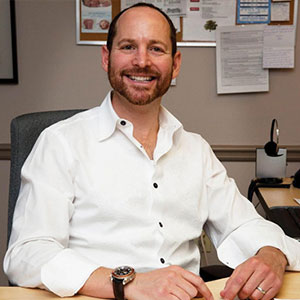
Mitch Weintraub, co-founder of Pinnacle Promotions (asi/295986), got his start selling funny T-shirts as a college student at the University of Florida.
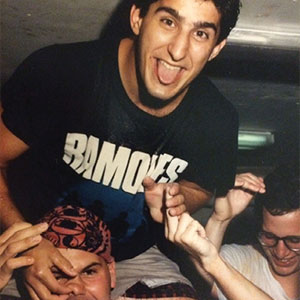
Danny Rosin (top), co-president of Brand Fuel (asi/145025), in his fun college days at the University of North Carolina, where he created T-shirts to sell at sporting events.
After graduation, Wilson and Reilly committed themselves to expanding their budding business, figuring they could find conventional jobs later if the venture failed. They rented a house in Philadelphia, setting up an office in the living room. In their first year, Reilly says, they sold over 1 million pairs of sunglasses. Over a handful of years, Pop! Promos has grown into a multimillion-dollar company with 17 employees and a growing line of Pantone-matched products. “We never needed to get those jobs,” Reilly says.
Of course, it’s more than just a need to fill an empty wallet that drives young entrepreneurs. Jeff Becker, who went on to launch Kotis Design (asi/244898) after volunteering to be the “T-shirt guy” for his fraternity as a freshman at the University of Washington, says he just has a love of selling. “I’m inherently good at making decisions and being in charge,” he says. “I like the win factor, and in selling you’re sort of winning. I’m very competitive.”
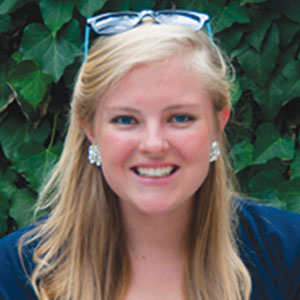
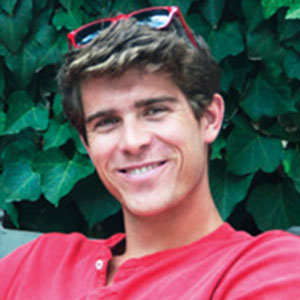
Sterling Wilson and Erin Reilly, co-owners of Pop! Promos (asi/45657), have grown their college sunglasses business into a multimillion-dollar supplier.
Balancing Act
One of the biggest challenges of starting a business while in college is balancing academics and a social life with professional obligations and ambitions. Social butterfly and self-described serial entrepreneur Daniel Fine knows that better than anyone. Launching his custom folding sunglass company Glass-U (asi/57361) while earning his bachelor’s from the Wharton School of the University of Pennsylvania was a juggling act, and early on, it was hard to keep all the balls in the air. “As a college student, there are tremendous distractions that inhibit success. … We would watch five-figure deals fall away because we hadn’t had time to check our inbox regularly,” the 21-year-old says. “If I had been fully focused, it would have led to way fewer f-ups.”
Still, Fine and his team gained a rhythm, especially after winning the licensing rights to provide branded sunglasses to the FIFA World Cup in 2014. Prior to that, Glass-U had been roundly rejected by practically every school and sports team they’d approached for licensing deals. The FIFA agreement was won through “a lot of grit” and fingers-crossed cold-calls. After that, Fine says, “Everything reversed.”
Though he believes his business would be much farther along had he skipped college, Fine doesn’t think it was a waste of four years. “It was definitely a great place to start a business,” he says of Wharton. Now that he’s graduated, Fine says he’s eager to move his young company out of the on-campus apartment that serves as its headquarters and focus all his energies on scaling the business and marketing to a wider audience.
“I think I learned the $500 lessons early and avoided some of the more expensive $5,000 lessons I might be learning today.”
Danny Rosin, Brand Fuel (asi/145025)
Kevin Ostromecki, 21, agrees that college has been an ideal business incubator to tend his growing custom shoe and screen-printed apparel line, Altix Clothing. Grinding through classwork and developing his business leaves the senior – who attends Albright College in Reading, PA – time for only about five or six hours of sleep a night, but he’s not complaining. “That’s what I’ve got to do,” he says. Ostromecki adds that he’s learning real-world lessons in time management and deadline pressure that he expects will serve him well once he’s out of school and realizing all his dreams for Altix Clothing’s future.
Rosin likes to joke that he actually attended two universities simultaneously: Chapel Hill and the “university of the streets.” The second institution, also known as the school of hard knocks, is the one that has paid dividends, Rosin adds. “Do you want to read about it in a book or actually live that business case study?” he asks. “I wanted to live it. … I learned everything on the fly.”
Lessons Learned Young
Many former college entrepreneurs say they still employ some of the strategies and tactics they learned while building a business on campus. Here are some of their words of wisdom:
Never take no for an answer. It’s still all about the hustle for Mitch Weintraub, CEO of Pinnacle Promotions (asi/295986), who says he used to beg for business, seeking out bars and restaurants to help sponsor and fund the production costs of the gag T-shirt line he started with a friend at the University of Florida. That early face-to-face sales experience has given him an edge in the age of anonymous Internet interactions.
You don’t need a lot of money to start a business. Erin Reilly, co-owner of Pop! Promos (asi/45657), says she and Sterling Wilson didn’t raise any money for more than a year and a half after launching, instead bankrolling the profits from one order to fund the next. “There was no funny money,” she says. “It wasn’t some silly startup with a ton of venture capital. … We really struggled in the beginning … living, eating and breathing our business.” Living lean, though, really helped hone the pair’s business smarts, Reilly adds.
A strong network is invaluable. College, says Danny Rosin, co-president of Brand Fuel (asi/145025), “opened a lot of doors for me.” Many of the relationships he formed as an undergraduate are still friends today – and some have even become clients, too.
Life doesn’t always turn out the way you expect. Reilly says one of the hardest things upon graduation was getting over her own pride. “In my mind, I was going to go to work at the White House or Deloitte and have some super fancy job,” she says. “Starting a sunglasses company turned a lot of people’s heads. … It’s been an awesome experience.”
Having fun and staying creative are key. The bright red walls of Glass-U’s (asi/57361) campus apartment-turned-global headquarters sport posters of Captain America and other comic book heroes. The desks are stocked with exercise balls rather than conventional chairs. Little touches, yes, but tangible evidence of a flexible, fun business team. Many successful entrepreneurs carry that loose, youthful vibe into their post-college ventures as well. Pop! Promos employees, for example, ring a bell whenever a sale is made, and celebrate meeting monthly sales goals with company happy hours.
Theresa Hegel is a senior staff writer for Wearables. Contact her at thegel@asicentral.com and follow her on Twitter at @TheresaHegel.
